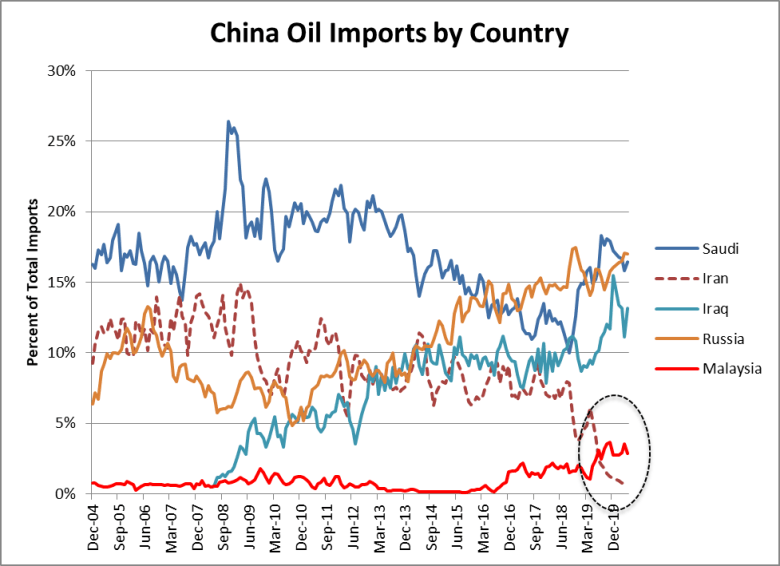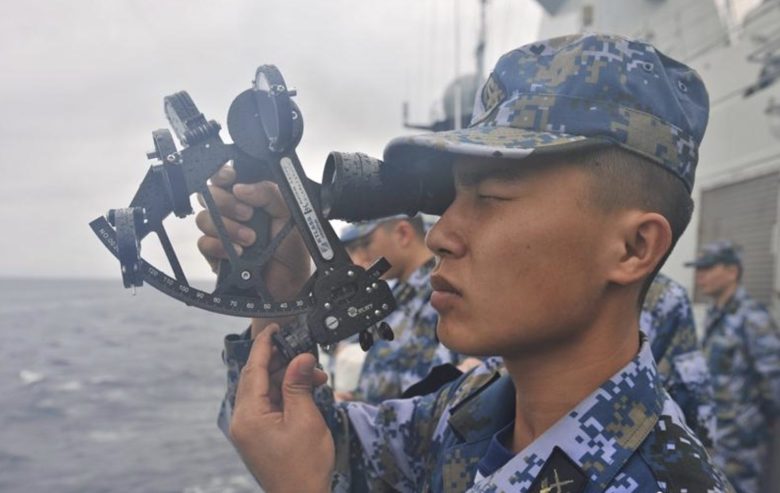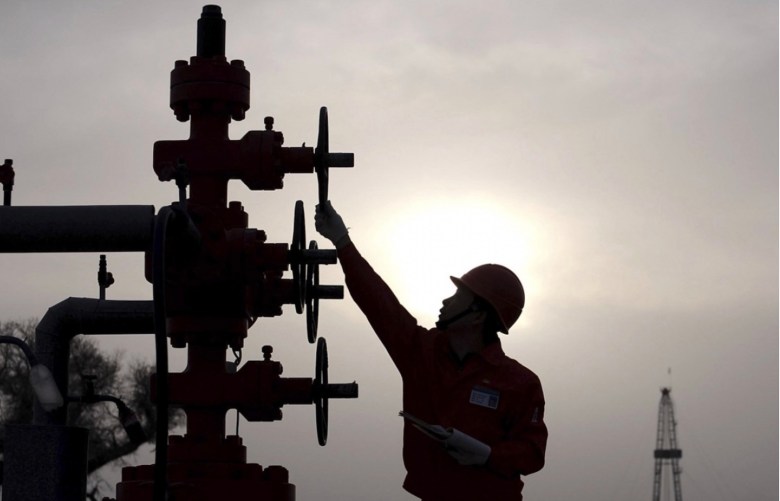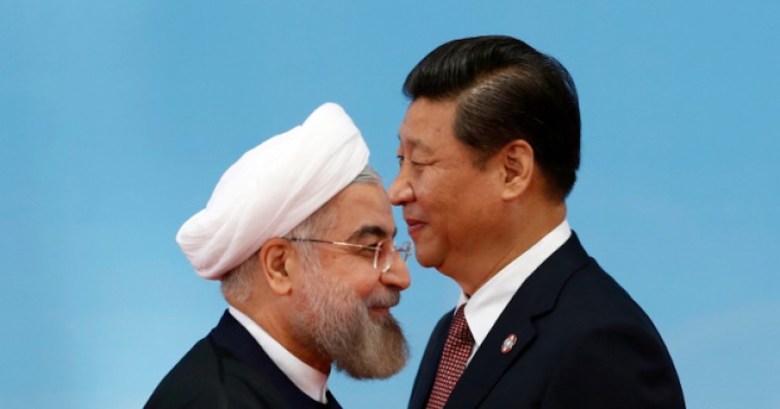David Goldman: ‘Pax Sinica’ in the Middle East, revisited No amount of US pressure can cripple Iran’s economy – let alone topple its Islamist regime – if China does not want it to happen
https://asiatimes.com/author/spengler-david-p-goldman/
Recent reports of a possible US$400 billion Iran-China trade deal took Washington by surprise, prompting US Secretary of State Pompeo to threaten China with comprehensive economic sanctions.
If the deal is signed, Pompeo said, “We will be sure to enforce all the provisions we have – all the sanctions we have on the Islamic Republic of Iran – applied to the Chinese Communist Party and their businesses and state-owned enterprises as well.”
That would seem to imply a complete shutdown of economic relations between the US and China, which is unlikely because China’s exports to the US comprise about a quarter of its manufacturing GDP.
Inveighing against Beijing Sunday on Fox News, Pompeo warned that “China’s entry into Iran will destabilize the Middle East. It will put Israel at risk. It will put the Kingdom of Saudi Arabia and the Emirates at risk as well. Iran remains the world’s largest state sponsor of terror, and to have access to weapons systems and commerce and money flowing from the Chinese Communist Party only compounds that risk for that region.”
Earlier, two senior State Department officials offered a more cautious assessment of reports that Iran and China will sign a $400 billion investment deal. “The scale and feasibility of the deal deserve healthy skepticism,” Keith J Krach and Brian H Hook wrote in the Wall Street Journal.
“We should doubt Beijing’s capacity to fund $400 billion of Iranian infrastructure,” they added. “To put it in perspective, China has invested less than $27 billion in Iran in the past 15 years…At best, this deal is a framework for cooperation.”
The agreement reportedly would include the buildout of 5G mobile broadband, access to China’s global positioning system and weapons development, according to a July 12 report in The New York Times. Details of what the agreement entails are not clear. If indeed it gets signed, the agreement will mean whatever Beijing wants it to mean.
In fact, China’s economic relationship with Iran withered after the Trump Administration slapped sanctions on Iran’s oil exports.
 As of May 2020, China claimed to have shut off virtually all oil imports from Iran in compliance with American sanctions. Iran’s share of China’s oil imports, according to Beijing’s data, has fallen from a peak of 15% in 2008 and a range of 5% to 10% during 2012-2018 to about 1% at last report.
As of May 2020, China claimed to have shut off virtually all oil imports from Iran in compliance with American sanctions. Iran’s share of China’s oil imports, according to Beijing’s data, has fallen from a peak of 15% in 2008 and a range of 5% to 10% during 2012-2018 to about 1% at last report.
China does appear to be importing some Iranian oil through various subterfuges, such as rebranding Iranian oil as Malaysian, as Radio Farda has alleged, and transferring oil from Iranian to Chinese tankers at sea. Under-the-radar purchases of Iranian oil might account for 2% of Chinese imports, enough to keep open an option with Tehran but not enough to alleviate Iran’s grinding economic crisis.
Now the question is: What does China want in the Middle East? In 2013 and again in 2016 I raised the prospect of a “Pax Sinica” in the region. China doesn’t have a Middle East policy; it has a global policy, and the prospect of a deal with Iran is a move on a global game board in response to American efforts to hinder China’s breakout as a technological superpower.
For policymakers who hoped that American sanctions against Iran would lead to regime change, the reported negotiations should underscore a basic strategic truth: No amount of American economic pressure can cripple the Iranian economy, let alone topple the Islamist regime in Tehran, if China does not want it to happen.
China is Iran’s largest trading partner. At $15 trillion, China’s GDP is 30 times that of Iran. Iran’s economy is comparable to that of a minor Chinese province. In one scenario, that is precisely what the Iranian economy will become.
On the periphery of the US Defense Department, one hears warnings that China is planning to control the seas on the geopolitical model of Alfred Thayer Mahan, as well as dominate the heartland of the Eurasian landmass after the theory of Halford Mackinder – as former Trump advisor Steve Bannon told me in a recent interview.
 The 16th installment of the China navy escort fleet conducts a two-ship alongside replenishment in the eastern waters of the Indian Ocean in a file photo. Photo: TwitterAlthough China is gradually building a navy, it has invested little in global force projection. It has only 7,000 to 14,000 special forces personnel, compared with America’s 66,000. China has avoided military entanglements outside its immediate periphery for the past five millennia and has little reason to change.
The 16th installment of the China navy escort fleet conducts a two-ship alongside replenishment in the eastern waters of the Indian Ocean in a file photo. Photo: TwitterAlthough China is gradually building a navy, it has invested little in global force projection. It has only 7,000 to 14,000 special forces personnel, compared with America’s 66,000. China has avoided military entanglements outside its immediate periphery for the past five millennia and has little reason to change.
The new warnings about a Chinese military presence in the Persian Gulf are quite a contrast to the previous complaint about China, the free-rider problem: Western strategists reproached China for drawing the benefits of Western military expenditures to guarantee the flow of oil to Asia from the Persian Gulf without contributing to the costs.
China has shifted focus to securing its energy import requirements overland through land-based pipelines, roads and railways that connect allied oil and gas producers to China outside of the reach of the US military.
That is a necessary but not a sufficient condition for a strategic shift by Beijing. As the world’s largest oil importer, Beijing’s interest has centered on political stability in the Middle East.
China presently imports about 15% of its energy consumption as measured in BTU’s. It still imports 75% of its total oil usage, and will remain vulnerable to supply disruptions in the Middle East for years to come. As Beijing gradually reduces its dependence on maritime transport of oil, and as electric vehicles replace gasoline-powered vehicles, its interest in Middle Eastern security will diminish over time.
China is drawn into the Middle East for national security reasons, for the same reason that Russia was drawn into Syria in 2015. As Vladimir Putin told top Israeli officials, the Syrian civil war had become a rallying-point and training ground for Sunni radicals who threatened Russian security.
 A Chinese oil and gas worker in a field in Xinjiang, northwestern China. Photo: TwitterBy forcing majority rule on Iraq and supporting a Shi’ite sectarian state, the US destroyed the one Sunni-led state in Mesopotamia and the Levant, forcing the Sunni radicals into the hands of non-state actors. Several thousand Chinese Uighurs joined the Sunni militants fighting in Syria.
A Chinese oil and gas worker in a field in Xinjiang, northwestern China. Photo: TwitterBy forcing majority rule on Iraq and supporting a Shi’ite sectarian state, the US destroyed the one Sunni-led state in Mesopotamia and the Levant, forcing the Sunni radicals into the hands of non-state actors. Several thousand Chinese Uighurs joined the Sunni militants fighting in Syria.
Chinese military analysts are as paranoid about the US as American analysts are about China. They wonder whether an American scheme to subvert China using Islamic militants guided what actually seems to have been a sequence of blunders. As I have reported earlier, over dinner in 2015 Admiral Luo Yuan told me, “General Petraeus created ISIS in order to destabilize China.”
“That’s ridiculous,” I replied.
“It is not ridiculous in the least,” Luo continued, in the benevolent tone in which one instructs especially slow students. “There are ISIS leaders whom we have identified and tracked, who were trained by Petraeus during the Surge” – referring to the counter-insurgency campaign that Petraeus conducted in 2008-2009 to contain a Sunni rebellion against the majority Shi’ite government that the US had helped bring to power in 2007.
I took a deep breath and explained: “This was a comedy of errors. The neo-conservatives in the Bush administration believed in majority rule as a matter of dogma, so the US held elections in 2007 and the Shi’ites won. Then the Sunnis who used to run Iraq under Saddam Hussein resisted with guerilla war and terrorist attacks. Petraeus was just a careerist looking for another star, and he told the Bush administration that he could fix the Sunni problem by paying off the Sunni tribal leaders.
“He handed out hundreds of millions of dollars to the Sunnis and gave them weapons and training through the ‘Sons of Iraq’ and the ‘Sunni Awakening.’ When Obama took US forces out of Iraq, a lot of the same Sunnis who took money from Petraeus faced the same Shi’ite state and became non-state actors – that is, ISIS. And the CIA’s support for Sunni jihadist opponents of the Assad government in Syria made matters worse, as the Defense Intelligence Agency warned in a notorious 2012 report,” I said.
Of course, I wasn’t quite that coherent but that was the gist of my reply.
My Chinese interlocutor was not impressed. “You’re trying to tell me that the people who run the world’s great superpower are complete idiots who don’t think about the consequences of their actions?”
US Secretary of State Mike Pompeo (L) and President Donald Trump have taken a hard line on China. Photo: AFP/Mandel NganIndeed, America’s bungling intervention in Iraq and Syria and its curmudgeonly withdrawal from the region have left China with a serious security problem – due to incompetence rather than malice, I hasten to add.
With Muslim majorities in Indonesia and Malaysia and rebellious Muslim minorities in Thailand and the Philippines, China is worried about more than its own Muslim minority. Jihad in the Middle East is a latent threat to its whole southern tier.
China keeps its friends close and its enemies closer; it supports Pakistan’s military as a counterweight to Islamic radicals, and bribes Turkey to pretend that nothing untoward is happening to what Turkey used to call its Uighur brothers.
China is the only country in the world employing mass incarceration, systematic cultural degradation and population transfers to crush Muslim separatists. And the success of its diplomacy can be gauged by the silence of the entire Muslim world.
What China will do in Iran in the near future is a matter of negotiation with the US. But China and Russia will step into the vacuum left by the shambles of American policy.
By October 2019, Putin had become “king of Syria”, as some media commentators put it. Very little has happened in Syria since then, which suggests that Putin’s policy in Syria has been quite effective.
During the past year, Israel has conducted more than 200 airstrikes against Iranian assets in Syria, with evident Russian permission. Israel’s relationship with Russia is difficult, but productive. Several weeks ago Israeli Prime Minister Benjamin Netanyahu revealed that Putin had promised to veto a United Nations Security Council resolution imposing a Palestinian state according to the 1948 armistice line, which the outgoing Barack Obama Administration failed to oppose.
 Chinese President Xi Jinping and Iranian President Hassan Rouhani in a file photo. Photo: FacebookThe prospect of Iran as a Chinese dependent worries Israel, as it should; China might help Iran build out its nuclear program. Even if China wants stability and the free flow of oil, fanatics in Tehran might exploit this to achieve a nuclear-weapons breakout. It is also possible that Chinese influence in Iran will keep the fanatics at bay. But Israel cannot count on a benign outcome.
Chinese President Xi Jinping and Iranian President Hassan Rouhani in a file photo. Photo: FacebookThe prospect of Iran as a Chinese dependent worries Israel, as it should; China might help Iran build out its nuclear program. Even if China wants stability and the free flow of oil, fanatics in Tehran might exploit this to achieve a nuclear-weapons breakout. It is also possible that Chinese influence in Iran will keep the fanatics at bay. But Israel cannot count on a benign outcome.
Israel is an American ally and depends on American arms. If US-Chinese relations continue to deteriorate, its position will be even more uncomfortable than it is now, as it attempts to preserve economic relations with China in the face of American pressure.
China has no malice towards Israel. It brings to mind the canonical definition of a philo-Semite, namely an anti-Semite who likes Jews. The Chinese, in general, believe the stereotype that Jews are clever business people and admire them for that.
They are also impressed by Israel’s creativity. With one-half of one percent of China’s population, Israel has eight Nobel Laureates in hard science; China has only one, and that was for traditional Chinese medicine, and the Chinese know that doesn’t count.
Although China views Israel with benign toleration, the survival of the Jewish State is not a concern in Beijing. By contrast, a significant minority of the US population identifies strongly with the Jewish State
As an American ally, Israel cannot help but bend to American pressure. I expect Jerusalem to conform to American demands to reduce Chinese involvement in major infrastructure projects.
But Israelis will continue to do business with China in a number of technological fields, especially Artificial Intelligence. Because China’s medical data is so much more comprehensive than that of any other country, it is impossible to be involved in healthcare AI without collaborating with China.
Comments are closed.
